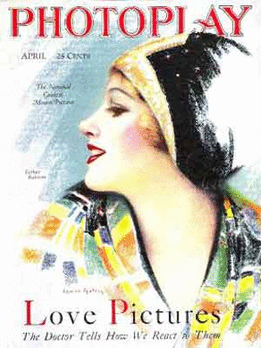
Introduction
Garbo’s conversation with Ruth Biery of Photoplay in December of 1927 (arranged by Harry Edington, not Metro publicity) was typically fraught with the anxiety of someone who never quite got used to the promotional aspect of her work. The two were to meet on several different occasions before Biery felt she had enough material for the projected series of articles. Ruth Biery’s Photoplay series was published in April, May, and June of 1928.

Part 1: The Story of Greta Garbo
It was Saturday evening, New Year's eve, 1927.
Greta Garbo sat at a tiny table in a tiny tea room in Santa Monica, California. She had just thrown from her shoulders a gray wollycoat “such as we wear in Sweden“ and was looking wistfully out of the window as though to penetrate the dark secrets beyond them.
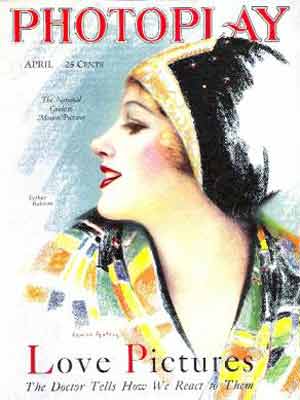
Photoplay Interview, April 1928
Let's not talk of me
“Let's not talk of me! It is New Year's eve. In Sweden that means so much, so very much. There we go to church and eat and drink and see everybody we know. I have been blue all day.”
“At home in Stockholm, they are skiing and skating and throwing snowballs at one another. The cheeks are red - oh, please, let's not talk of me."
Why must people talk about me?
"I was born, I grew up, I have lived like every other person. Why must people talk about me? We all do the same things in ways that are just a little different.”
“We go to school, we learn, we are bad at times, we are good at other. We find our life work and we do it. That's all there is to anyone's life story, isn't it? I have been reading other life stories. Some people were born in red brick houses, others in plain white board ones."
Why should the world talk about them?
"What is the difference? We were all born in houses. I will not have it printed that I was born in this house or that; that my mother was this or my father that. They were my mother and my father, just as yours were your mother and your father.”
“To me that is what counts. Why should the world talk about them? I don't want the world to talk about my mother and my father. Nor my brother, nor my sister.”
My Sister
“My sister – she has died since I came to this country – I cannot believe it until I return to my home and find - she is not there to greet me.”
My Brother
“My brother – he wants to come to America. I do not know. Pictures? He is so timid but then I too, was timid. Why should I tell the world about them? They are mine!”
I am the Youngest
“No, I am the youngest, but they have always treated me as the oldest. I can't remember being young, really young, like other children. I always had my opinions but never told my mind. No one ever seemed to think I was young.”
My Father
“My father died when I was fourteen. God, what a feeling. Someone you love is there, then he is not there. Gone where you can't see him, can't talk with him.”
“You go to the studio, work all day, come home to the hotel, lie down, turn out the lights and think about him. The same flesh, the same blood – yet he is gone, never to return. Gone - my God, what a feeling.”
Childhood
“I have always been moody. When I was just a little child, as early as I can remember, I have wanted to be alone. I detest crowds, don't like many people. I used to crawl into a corner and sit and think, think things over. When just a baby, I was always figuring, wondering what it was all about - just why we were living.”
“Children should be allowed to think when they please; should not been molested. “Go and play now”, their mothers and fathers tell them.”
“They shouldn't do that, thinking means so much to even small children. When I wasn't thinking, wasn't wondering what it was all about, this living; I was dreaming. Dreaming how I could become a player.”
No one of my people were on the stage
“No one of my people were on the stage. It was just born in me, I guess. Why, when I was just a little thing, I had some water colors. Just as other children have water colors. Only I drew pictures on myself, rather than on paper.”
“I used to paint my lips, my cheeks, paint pictures on me. I thought that was the way actresses painted. Long before I had been in a theater, I did this. I don't know where I got it: from pictures, from others talking, or just from me, the inside of me."
I didn't play much
“I didn't play much. Except skating and skiing and throwing snowballs. I did most of my playing by thinking. I played a little with my brother and sister, pretending we were in shows. Like other children. But usually I did my own pretending. I was up and down. Very happy one moment, the next moment - there was nothing left for me.”
The Theater
“Then I found a theater. I must have been six or seven. Two theaters, really. One was a cabaret; one a regular theater, across from one another and there was a back porch to both of them. A long plank on which the actors and actresses walked to get in the back door.”
“I used to go there at seven o'clock in the evening, when they would be coming in, and wait until eight-thirty. Watch them come in; listen to them getting ready. The big back door was always open even in the coldest weather. Listen to their voices doing their parts in the productions.”
“Smell the grase paint! There is no smell in the world like the smell of the backyard of a theater. No smell that will mean as much to me – ever. Last night, for the first time since I came to this city, I went to a theater. Went down to the Biltmore in Los Angeles. Went behind and talked with the girls; watched them make up; smelled the backyard of the theater just as I used to when I was little. Night after night, I sat there dreaming. Dreaming when I would be inside – getting ready.”
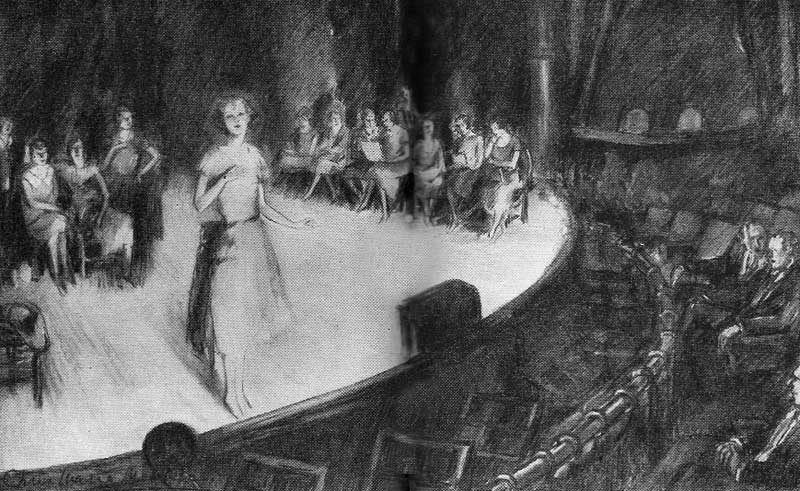
Greta on the Dramaten stage. Illustration by Photoplay
Fighting
“I was alone. I don't like to be with people and I can never stand any kind of fighting. One night when I was going home, I saw two men fighting. They were drunk. I can't stand people who are drunk! One was big and the other little.”
“The big man was hurting the little one. I went up and pulled on the big man's sleeve. Asked him why he was doing it. He looked down on me.”
“I was eight years old. ‘That's all right. You can go now. Here's your little daughter.’ Then I ran away. I wasn't his little daughter. It's just the same today. If I see an accident or hear two people quarrelling, I am just sick all over. I never fight myself and I won't do any fighting in pictures."
I hated School
“I hated school. I hated the bonds they put on me. There were so many things outside. I liked history best but I was afraid of the map - geography you call it. But I had to go to go to school like other children. The public school, just as you have in this country.”
Movies
"I went to the movies, just like other children. I didn't see a regular theatre – inside, until I was twelve but I went to the movies often. I usually paid for my tickets, but sometimes, the man at the door could be persuaded to be kind, and money wasn't necessary.”
Royal Theater in Stockholm
“That's all I knew of stage until I was sixteen. Then I met an actor and I told him, just like millions tell actors, that I wanted to go on stage. Asked him, just all the others, how I could do it. He called upon another actor, better known, and sent me to him. It was Franz Envall. He is dead now but he has a daughter in stage in Sweden. He said he would ask if they would let me try to get into Dramatic School of the Royal Theater in Stockholm.”
“The School is a part of the Royal Theater of the King and Queen of Sweden. No, it doesn't cost anything to go there but you are not paid for your work either. You take a test to get in. There is a jury of about 20 people. Newspapermen-critics; theatrical people, actors, the heads of the School and others. I studied for six months. They gave me a Swedish play by Selma Lagerlov and Madame Sans Gene, a French one."
My Test
"My test came on a beautiful day in August. It wasn't cold, but it wasn't hot either, as it is in this country. I remember it was right after noon. I was just seventeen. And I was frightened. My knees shook. I trembled all over. Oh, I almost fainted afterwards! I couldn't see a person.”
“They were down in front. All I could see was that black pit – that black open space. All I could here was whispering. I was so shy! I had never tried to act.”
“The one-year pupils were on stage. They read the lines of the parts which were not mine. I said my speech, all right. Then I just ran off. I forgot to say good-bye. And I was so frightened. I thought they would think I had not been polite because I had forgotten.”
“In a couple of days, they telephoned that I had been admitted. Oh, God, I was happy. I almost died. Oh, now, even now, I can hardly breathe when I remember. For now, pretty soon, I knew I was to be a real actress!”
The Acting School
“But I was a very bad child. I upset the whole school. I liked to go out at night. We lived right in Stockholm and distances are not as far there, you know. You can take a taxi and be almost anywhere in five minutes. Any theater in the city. I liked to go to the theater in the evening. So I was late almost every morning!”
“Exercises came first and I almost always missed them. The other pupils were charming, lovely girls who were always on time. Then in would come Garbo, late as usual. I'd come in the door and say: “There's a rumor about that this school is still here. But I'm so tired; Garbo's so tired“ and nobody would say a word to me!”
“Then it became serious. I started being late. If one had the privilege, you know. No, they didn't scold me. If I had been scolded, I'd have been there. I cannot stand to be scolded. Usually, we'd go out and drink coffee, all together, when I finally got there. Yes, they taught us dancing. But I can't dance. I was ashamed to dance. I was so big. Oh, yes, I was big. I was just the same size I am now when I was twelve years old.
“I haven't grown a bit since then. Isn't that lucky? Everywhere I went as a child, I was pointed at because I was so big - so very big. The school was wonderful. We had the very best teachers. We were given plays to study. Two pupils and a teacher would study together. No, we were never on the stage. Oh we were on the background of the Royal Theater. We never said anything. Just went on to learn what you call stage presence.”
Stiller
“The usual course was two years. But I was just beginning the third, when one of the teachers came to me and said, Mauritz Stiller wanted a girl to play in a picture for him. I said: “Ya? I will go and see him!“ I didn't think much about it. I never get thrilled about anything until it happens. It hurts too much to be disappointed.”
“That day, after school, I went up to his house to see him. I had never seen Mr. Stiller. To me he was just a very big man. He is very big in Europe, you know; one of the biggest. He was not at home. So I sat down and waited.”
“Pretty soon he came in with his big dog. I started trembling all over. He seemed such a funny person. He looked at me, looked me up and down, looked me all over. He has told me since, exactly what I had on, even to my shoes and my stockings, I had on black, low-heeled low shoes, with black stockings. He just said a few words about the weather and things in general.”
“At times it seemed as though he looked away, but I know he was really looking at me every moment. After quite a few moments, he said: ”Well, can't you take off your coat and hat?” – just as though he had asked me a dozen times before, when he had said nothing about it.”
“Then he just looked at me some more and said: “What's your telephone number?” Then I knew it was all over, “He isn't interested”. I thought. “When they're not interested they always ask your telephone number.” So I put on my hat and coat and went out. No, I wasn't worried. I just didn't think any more about it.
|
Part 2: The Story of Greta Garbo
Her childhood in Sweden, a little lonely but colored by vague dreams and shy ambitions.
This was the theme of the first instalment of Greta Garbo's own story. In it too, Miss Garbo told of her examination for entry into the Royal Dramatic School in Sweden, of her great desire to become an actress.
She described frankly her bad habit of being late for classes, her neglect of routine and she hold of her first meeting with Mauritz Stiller, the director who first discovered her screen possibilities. Now go on with the second chapter in the life of the fascinating woman.
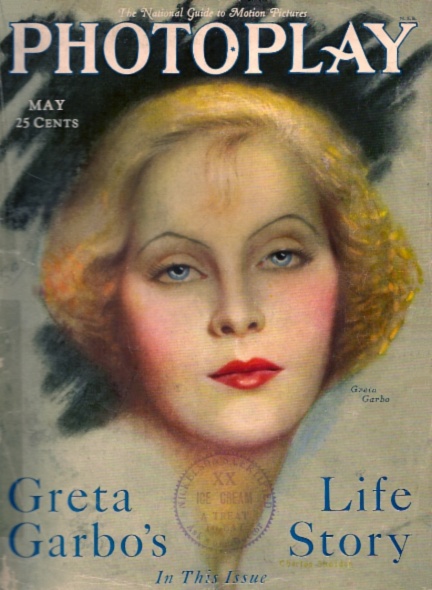
Photoplay Interview, May 1928
Screentest with Stiller
“…..and a few days later, Mr. Stiller telephoned me to take a test at the studio of The Swedish film Company. I was pleased but not even yet, very excited. I do not get excited until I have something in my hand.
I went out on the street car to the studio with a girl named Mona Mortenson. She is here in America – in Hollywood now but she is going back to Sweden. The pictures are not so good to her. We went to the Dramatic school together. Was it not funny that we met at the way to take the test together and then meet again in this city?
The test was to me very funny. The stage is so different from the movies. On the stage you have your voice but in the movies, only your face. I was all shaky. I come off the street, go in and they make me up and then they take me in and tell me to lie in a bed and be sick. Very sick. I didn't know what it was all about. It seemed to me like a big joke, to come off the street and be right away sick and I was ashamed. I was ashamed to try and put myself over, as you say it. I had never done anything to put myself over before, and it made me very ashamed to do it.
Mr. Stiller waited a few moments and then said: 'My God, can't you be sick? Don't you know what it is to be sick?'
Then I knew it wasn't play and it wasn't funny. I knew it was necessary in the movies and I became a very sick lady. I went home. I still did not know whether I would get any part. I went on at school. Then, in a few days he called me and told me he had a place for me. I had it in my hands; now I could get a little excited."
Gösta Berling
"…and he gave me the part of Countless Dohna Gösta Berling. The very best part for my very first picture! The first days of work I was so scared that I couldn't work. I was sick in earnest. Finally, everyone went out and left me.
The electricians, the prop boys – even Mr. Stiller. He told me to practice alone. But I knew he was in some corner watching. I looked all around and could not see him, but I knew he was there. So I would not practice. I would not rehearse all by myself – I would not look so stupid. Lars Hansen played my leading man. Now he is back in Sweden but there were no love scenes; not even a kiss. It was not an American picture. The picture took a long time.
There were snow scenes und we had to wait until it was winter. When it was over, I was no longer frightened. But I am always nervous und restless when I am making a picture. I cannot help it. That is why I never want people to see me while I am acting. I do not let people on the set. And I stay by myself all I can while I am making a picture. I sit in one corner alone, or go to my dressing room, or I walk outside by myself while the others are working.
I cannot stand it for someone to come up and say, “What did you think of the football game?” as they do here in America. I cannot get back on the track. I cannot do my best work then. It is the same with every picture – I tremble always, all over.
Miss Lundequist, a very big Swedish actress, who played in the picture with us. She is a most marvellous person. She has the most amazing eyes of any person. So much soul and so tired always.”
Berlin
"Berlin was wonderful to us. Oh yes, it was a very big opening. Everything that Mr. Stiller does in Europe is big. There, he is the master. Everybody goes to see his pictures. We went on the stage. They sent us many flowers.
They had sent way to Stockholm for us and they made it a very big time for us. The German people are wonderful. They do not touch you, yet they have their arms around you – always. And Berlin! The love there is in it.
I will never forget when I came to it. The smell of the City. An amazing smell that has everything in it. You can feel it in your breast, when it is coming. I had not been in a big city before – where there were so many, many people. But I could feel the smell long before we were really inside the city - it was as though I had smelled it before been there before, as I told you.
While we were there, that one week for the opening, people spoke to Mr. Stiller about our coming to America. He talked but he did nothing. We went back to Stockholm, to get ready to make a German picture.”
Constantinople
“In a month we went back to Berlin and then on to Constantinople, where we were to make the picture. There were to be many Turks in it. Constantinople!
I do not know how to describe it. It isn't like what people say about it. They are not in costume. They dress like European people. Except the very old Turks, who are dirty. The streets-narrow with dirty little shops; dirty cafes, filled with food which is oily.
The lazy Turks - they are fascinating. One day I was walking alone an the street and I followed along behind one of the old Turks, the dirty one with the funny pants. You know them? I do not know how many hours I followed him.
How did not go anywhere; did not have anywhere to go but wander. He was so dirty but so fascinating. We never started on that picture (Odaliske fran Smolna). The company went broke. Mr. Stiller had to go back to Germany to see about the money which was not coming. I was alone in Constantinople.”
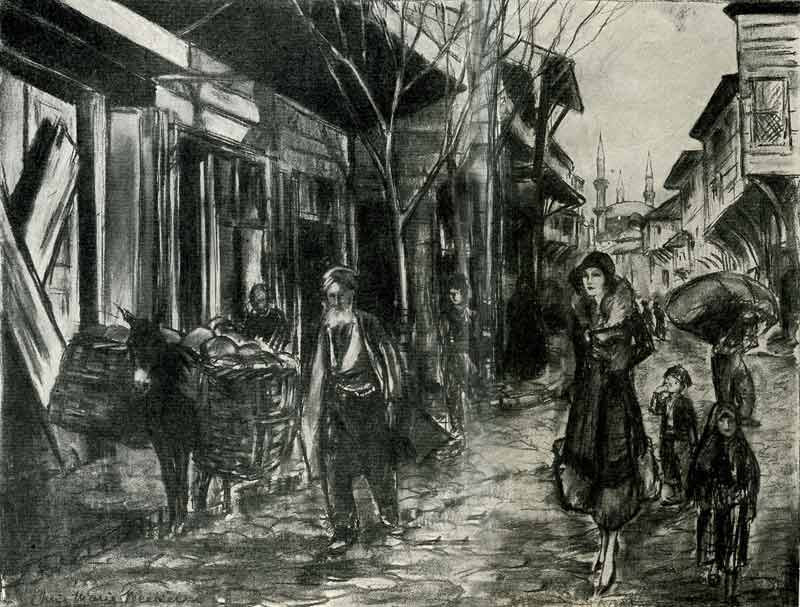
GG in Constantinople. Illustration by Photoplay
Einar Hansen
“Oh, yes Einar Hansen. The Swedish boy who was killed here in Hollywood not so long ago – was there, too. He was to play with me in the picture but I did not see him often. I was invited to the Swedish embassy.
I went two times but I did not like it. I did not want to be around people. I liked to be alone in Constantinople. I went to the bazaars. I had a guide with me. They are so big, you could never find your way out of them without someone to guide you. I was so restless.
It was a very big disappointment not to have the money for our picture. But I was not lonely. I walked around the old city by myself mostly.”
I love to Travel
"I love to travel. I would like just to have enough money to travel. I have no place I want to go , except back to Sweden. I want to go every place! Back in the hills of China. To Japan. The Chinese and the Japanese have such strange faces. I wonder what must be on the inside of them.
I would like to touch in China the little things that have been so many thousand years on earth. I would not care for company. It is not necessary to have company when you travel. If I go back to Sweden? I do not know.
One month, two or three. Perhaps it will be too small for me. I want to go everywhere and see every people.”
Back to Constantinople
“Yes, I would like to go back to Constantinople. But I would not like to live there. The colours of that country. You cannot describe them.
I would like to see them again but not stay longer than the one month I was there then. It was a shock, about not making that picture. But it was none of my fault. Although I was so restless, why should I have worried?
There were other companies and I was young and was alone in a big, wonderful city. Mr. Stiller came back and took me to Berlin and had me make another picture which he was not directing. It was ‘The Street of Sorrow’ (A Joyless Street). It was a very bad picture. When it ran in New York, the people did not like it.”
When I met Mr. Mayer
“Louis B. Mayer was in Berlin. He wanted to sign a contract with us for his company. Whatever Mr. Stiller said, I knew was always the best thing to do it.
I would say: ‘Is it good?’ and if he say, ‘It is good’, I would do it. When I met Mr. Mayer, he hardly looked at me. I guess he looked at me out of the corner of his eye but I did not see him. All of the business was done with Mr. Stiller. I signed a three year contract. The money was to be 400 dollars a week and 600 and 750 for forty weeks each year.”
I am not a good business woman
“I do not really know what I got in Europe. That is the truth. Mr Stiller gave it to me and it came and it went like all money. I am not a good business woman.
I went back to Stockholm to get ready. It was strange; a very strange feeling. I was looking forward to something I had never seen. I did not know how it would turn out.”
America
“People here do not know what it means to my people when somebody goes to America. There is always much crying , a feeling that they will never come back to their own country and their own people. My people do not realize how short the world is.
They do not know how the boats and the trains go. They feel they are going away forever. My mother didn't say much. She said, “I think you know better, I want you to go where you should.”
My mother and my sister and my brother went to the railroad station. My little mother stood there and looked at me. Her eyes were swollen big.”
Brother and Sister
“My brother's name? My sister's? What does that matter? They are my people. Why should I tell their names to other people? Names do not matter. If I should read them - it would hurt. Hurt here.
I was very brave. All I said was, “I will be back in one year. It is only twelve months.” I have been away two and one-half years. My sister. I call her my little sister but she was two years older. In only eight months after I had gone, she, one of my people, has passed. That is the hardest.
To be so far away when something happens. Your own flesh and blood. I couldn't understand. She had always been so healthy. She was so beautiful. Then she got sick – just a little sick, then… I would have brought her here by now. She would have been in pictures. But the way things are here now.
The way you have to work to get the results! Perhaps, it is better – my sister. We sailed from Gutenberg.
Oh that was marvellous, on the ocean. I would love to do that trip over and over. You feel free on the ocean. There you are and you cannot walk away. Unless you want to walk on the water. It lifts a stone from you. You are almost happy.”
Happy
“Happy is too big a word to use very often. It means so much to our country .The word happy, that we hardly speak of it. Here you use it so common. I had a heavy coat on me and walked around on the deck and watched the ocean.
I played that game where you push things back and forth, a little. I did not talk to anyone but a tiny boy. Little Thommy. I wanted so madly to give him cakes but he had never eaten cakes. His mother and father were very careful.”
Children
“Children don't get close to you. You can say intelligent things to children.
When you talk silly things, they just look at you and you feel they are thinking: “Why are you saying such silly things for?” Children are very sensible persons.”
New York
“We came into New York harbour in the night. When we saw the lights, lot of people screamed. They were from New York City. You felt it with them. They felt like you will feel when you go back to Sweden. I thought that America will be all flowers.
I thought there would be almost carpets of flowers on the streets of New York City. I wasn't terribly excited. I do not get excited but I was ready to see all the flowers in the streets of the American cities.”
|
PART 3: The Story of Greta Garbo
In the two previous instalments of her fascinating story, Miss Garbo told of her lonely childhood in Sweden and of her first ambitions to become an actress.
As a young girl she entered the Royal Dramatic School in Stockholm and while she was still a student, Mauritz Stiller discovered her screen possibilities.
Her first European picture was a great success but because of bad financial conditions in Europe, her career seemed at a standstill when Stiller met Louis B. Mayer in Berlin.
Mayer signed a contract with both Stiller and Miss Garbo. At the end of the summer, Miss Garbo sailed for America. She was shy, strange and she knew no English. But she had high hopes and expected to find New York carpeted with flowers. Now read the final chapter of this engrossing life story.
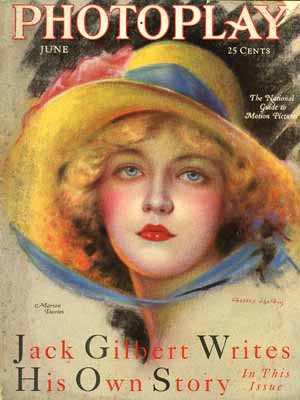
Photoplay Interview, June 1928
New York cont.
“No, I did not find flowers in New York City. I found heat! I came at a very bad time of the year. It was in July, 1925. I could not get my breath. We went to a very bad hotel in New York City. A Swedish man came over with us, who had stayed there before.
I asked if all hotels in America were like this one. I was there three months but I saw very little. I went from my room to my bathroom and back to my room again. I used almost all of the water in New York City.
I stayed in the cold water to keep myself from being roasted. I did go to The Follies and to the Winter Garden. I liked that. It was fun to watch the American people.”
California
“We came to California in September. In New York, I spent all of my time in the bathtub thinking about how it would be when we got to California and I would start working in American pictures.
Then it was four months here, before I started in one picture. I was to work with Mr. Stiller. When it could not be arranged, they put me in The Torrent with Mr. Monta Bell directing.”
Mayer
“Yes, it was very different. The studio here is a bit of a factory. The studios here are so huge, they have to be kept as factories.
Too many people in them to have it different. But I was a little afraid of them. I could not speak any English. I did not know about the American people.
In Europe we had always been working with just a few people. We knew everybody. It was very funny. Before I had started on The Torrent, Mr. Mayer called me back into his office and wanted me to sign a new contract with him.
But I said, 'Meester Mayer' – I could not then talk but a little English and not so good pronunciation – 'Meester Mayer, I haf not done yet one picture. Let us vait until I haf been in one pictures.'
He wanted me to sign for five years with him. I could not understand it. While I was making this picture, this The Torrent and when I was finished, he called me into his office many times and asked me to sign for five years. I could never understand what he meant by it.
We never said anything about money. He just said he couldn't afford to advertise my pictures and put money into me, if I would not sign for five years with them. I had already signed for three years and why should I sign again when I had not yet a picture and then when I had only ‘The Torrent’?“
Torrent
“It was very hard work but I did not mind that. I was at the studio every morning at seven o'clock and worked until six every evening. I was so tired. I did not go anywhere. I moved down to Santa Monica to be near the ocean.
I would go home and lie down and think, think about my sister and my brother and my mother, back home, in the snow in Sweden.”
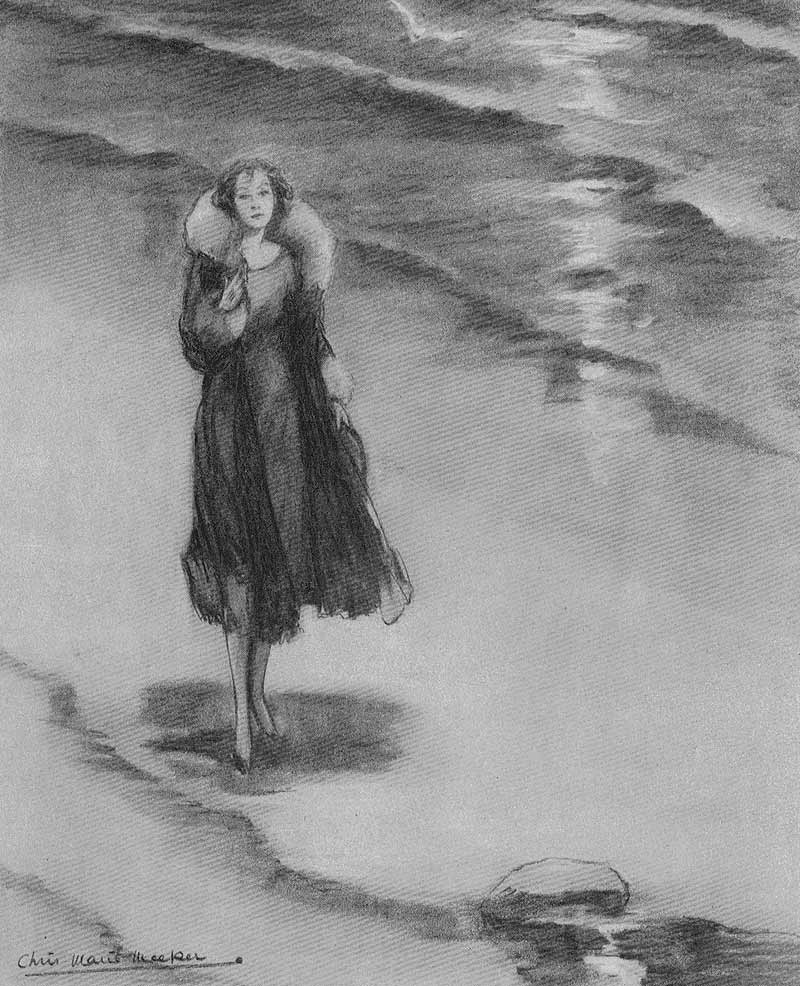
GG walks at the ocean. Illustration by Photoplay
The Temptress
“After ‘The Torrent’, I started on ‘The Temptress’ with Mr. Stiller. But Mr. Stiller is an artist. He does not understand about the American factories.
He has always made his own pictures in Europe, where he is the master. In our country it is always the small studio. He does not understand the American Business. He could speak no English.
So he was taken off the picture. It was given to Mr. Niblo. How I was broken to pieces, nobody knows. I was so unhappy I did not think I could go on. I could not understand the English directions. Week in, week out from seven until six. Six months on the story.
More than twenty costumes to try on over and over. That is why I do not care about clothes. There are so many clothes in every picture. I cannot think of them when I am away from a picture. I never missed a day. I was never late to work. It is not true that I have refused to work and have said, “I will go home” as the papers have said about me.
When I had finished The Temptress, they gave me the script for ‘The Flesh and the Devil’ to read. I did not like the story. I did not want to be a silly temptress.
I cannot see any sense in getting dressed up and doing nothing but tempting men in pictures. Mr. Mayer called me in and said I was to start right away.
My sister had died while I was making The Temptress. My poor body wasn't able to carry on any longer. I was so tired, so sick, so heart-broken. I went to Mr. Mayer and said, 'Meester Mayer, I am dead tired. I am sick. I cannot do another picture right away. And I am unhappy about this picture!'
And they said: 'That's just too bad. Go on and try on your clothes and get ready.' If people are not happy, I should think you would try and make them happy. 'I am sick' was all that I answered.”
Greta Garbo go home
“I am not the kind of a girl who can powder my nose and say: 'Ah, go on with you.' What wouldn't I have given to have been born an American girl.
To have understood the American language and the American business. What could I do? I went to the hotel in Santa Monica and lay down to think. I did not think I could go on. I had heard of a manager. So I got one, somebody who could talk the English language. He saw how sick I was, how tired, 'Poor lady, why don't you go home and rest?' he told me.
So I went home for two days. Then I heard about the papers. They say: 'Greta Garbo go home – She is temperamental – she cannot be handled.'
I did not understand that, so I went to my manager and said: 'Maybe I better go back to the studio. I have rested two days. It does not make any difference here whether I am tired and sick and have lost my sister. I do not understand and I will go back.' So I went back and said nothing.”
Flesh and the Devil
“And there I met for the first time, except to nod to him, John Gilbert. And he was so terribly good to work with! He has such vitality, spirit, eagerness. Every morning at nine o'clock he would slip to work opposite me. He was so nice, that I felt better; felt a little closer to this strange America.
When I finished 'Flesh and the Devil', they wanted me to do 'Women love Diamonds'. I could not do that story. Four or five bad pictures and there would be no more of me for the American people.
I did not know what to do. No one would tell me. I still could not speak good English. So I went to the hotel and sat down and waited. I did not know what else I could do. I wanted to be home in Sweden.”
Refuse to work
“And the next morning they telephoned me to look at some sketches for the story. It was the first time I had not done what they wanted, except to sign a new contract when I already had a new one. And I had a letter saying by not coming down to see the sketches I had refused to work and they could not pay me.
What could I do? Then a very kind friend told me about a man who would understand both me and the people of this country. I had a lawyer to manage me up to this time. But this new man, they said, knew all about the studio and all about the making of pictures.
He had been in Europe a long time and would sympathize and understand that all I wanted was no trouble and just a chance to make good stories. So I went to see Mr. Harry Edington and after talking to me every day, almost, for more than a week and coming to believe that I was not all the papers had said about me. He said he would handle all of my things for me.
My contracts, my money, my work – everything. You do not know what that means to a girl who knows nothing about this big country and this big American studio business. Since then, I have not had trouble. Because he understands both their business and understands me and my business. But before I employed him I was home seven months without pay.
I did not say anything or do anything. And the papers always said I want money. I was terribly restless. I figured out that maybe the next moment I would he packing my trunks. I was so low, as you say, that I thought I would break. but it's like when you are in love.
Suppose the man you love does something to hurt you. You think you will break it off but you don't do it.”
New Contract
“Finally, they call me and say they have a story. I read it and went out and asked what part I was to play and they said the little part. Aileen Pringle and Lew Cody were to play the big parts.
Mr. Edington tell me to do it, so I did not say a word but tried on the dresses and was all ready to play the little part in the picture, when Miss Pringle said she would not do it. Then they called me and said I was impossible and could not be handled.
For the first time I answered Mr. Mayer back. I said I had all my clothes fitted and was ready to play the little part. What more did they want? I am very sorry I answered back. I guess I did not understand them. It was all because I speak one language and they speak another.
And the newspaper men who print all the bad stories, they could not understand either. They said it was a new contract they wanted. So Mr. Edington fixed up a new contract, for five years. Because it was not money I had wanted in the first place, money was not so important.
But Mr. Edington's contract did give me more money than when I came to this country. They had a cartoon of me in my country, holding out my hand with many American dollars. They thought I get five thousand dollars a week.
That is funny. Now Mr. Edington makes us understand one another and we are all very happy. And that is all there is to my story. I am 21 years old and I have played in two pictures in Europe and five in this country. I was nineteen when I came to New York City.”
I will go back to Sweden this year
“I will go back to Sweden this year. I do not know whether I will bring my mother to this country. When I am working I like to be alone.
And if I were working hard – I love my mother. We will see. I want to stay in this country. Hollywood is the place to make pictures. It is where there is a future for me or any other actress.”
Good Friends
“I can not help it, if I do not like to be with many people. I have some good friends. Mr. and Mrs. Jannings. Mrs. Jannings is a real woman.
She says what she means. Mr. Jannings is a real man. I do not mean feminine and masculine, as you say it. I mean the inside, deep – real people. I have to keep learning German so I can talk with my good friends, the Jannings.
They wanted me to go to a Mayfair party. It was a nice party but why do I have to go. I do not like parties. I never know what I am going to do next, when I am not working. I walk on the heath for many miles. But I never know what time I will do it. I stand on the beach and watch the sea for an hour, perhaps two.
What is that to people? I like it. That is all there is to it. I do not think one person should judge another. You can never tell why one person does not like another. I do not think one person can talk about another. It is not of their own business they are talking.”
I want to be a big Actress
“I love my work. I want to be a big actress. That is natural. Do you not want to be big in what you are doing? And the other American people?
When I was starting Anna Karenina (Love), the wardrobe department sent me flowers. I was so pleased. I know in a big factory-studio they cannot send you flowers and do things for others. But it made me feel a little closer.”
Love
“Love? Of course, I have been in love. Love is the last and the first of a woman's education.
How could you express love, if you have never felt it? You can imagine but it is not like the feeling Who hasn't been in love? I am no different from the others.”
Marriage
“Marriage? I have told many times, I do not know. I like to be alone; not always with some other person.
There are many things in your heart you can never tell to another person. They are you. Your joys and sorrows and you can never, never tell them. It is not right that you should tell them. You cheapen yourself, the inside of yourself, when you tell them.”
There is really nothing to my Story
“There is really nothing to my story, as I told in the beginning. I was born in a house, I grew up like other people. I have found my life work, and all I want is to do it and then travel. I have had troubles the same as other persons. The company went broke in Constantinople but I found another.
Mr. Stiller had to go back to Europe. How I miss him. He talked in my own language. I owe everything to Mr. Stiller. I have not understood everything over here, but now everything is settled and we are all working together. I cannot stand trouble.”
Future
“The future? I have no plans. After I go back to Sweden, then who knows? My contract is for five years, remember. I have told the truth.
That is everything there is to it. Honest ! No. American cities are not covered with flowers but I have found many flowers in America. And that's all. My little story of my life in pictures - of my whole life as far as that matters – is finished.”
|
End
Greta Garbo drew her grey woolly cloak “such as we wear in Sweden” around her.
Her eyes sought the windows, as though to penetrate the dark secrets beyond them. And as she looked past me, beyond, into a world which my eyes could not vision, there was born in me a great ambition, an ambition to acquire this woman as a friend.
There dashed across my mind a story I had forgotten. Greta Garbo was on one of her rare party gatherings. A woman told a story about Susan. A story which left the inflection that Susan was not honest. “But I thought you and Susan were friends?” Greta had inquired.
“Why, we are!” the woman had laughingly answered. “But if you are friends you could not say that of one another.”
You have heard her reference to children. She understands them because she is herself a child. In her simplicity, her beliefs, her devotions. And as I listened to her life story, I knew I could not help but believe each word she was saying.
She told it in perfect English, exactly as it is written, the English of a child who is learning. And I wondered, as she concluded, has America become so complicated, so civilized, that it has become difficult for them to love and to believe in their children?
|
© Copyright by Photoplay
|